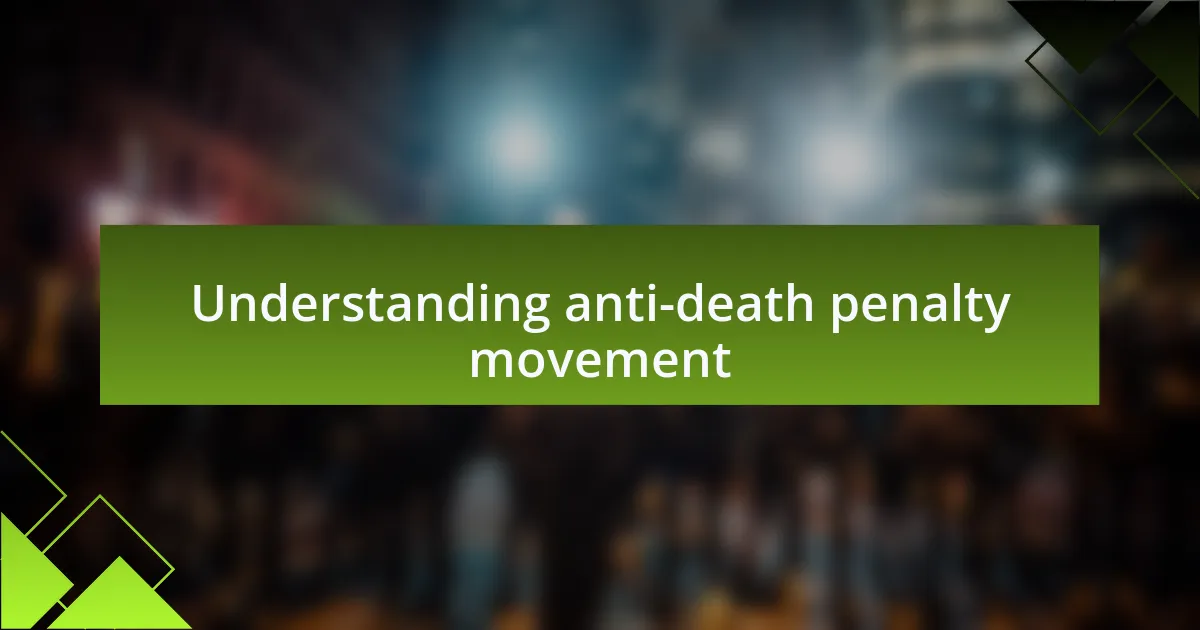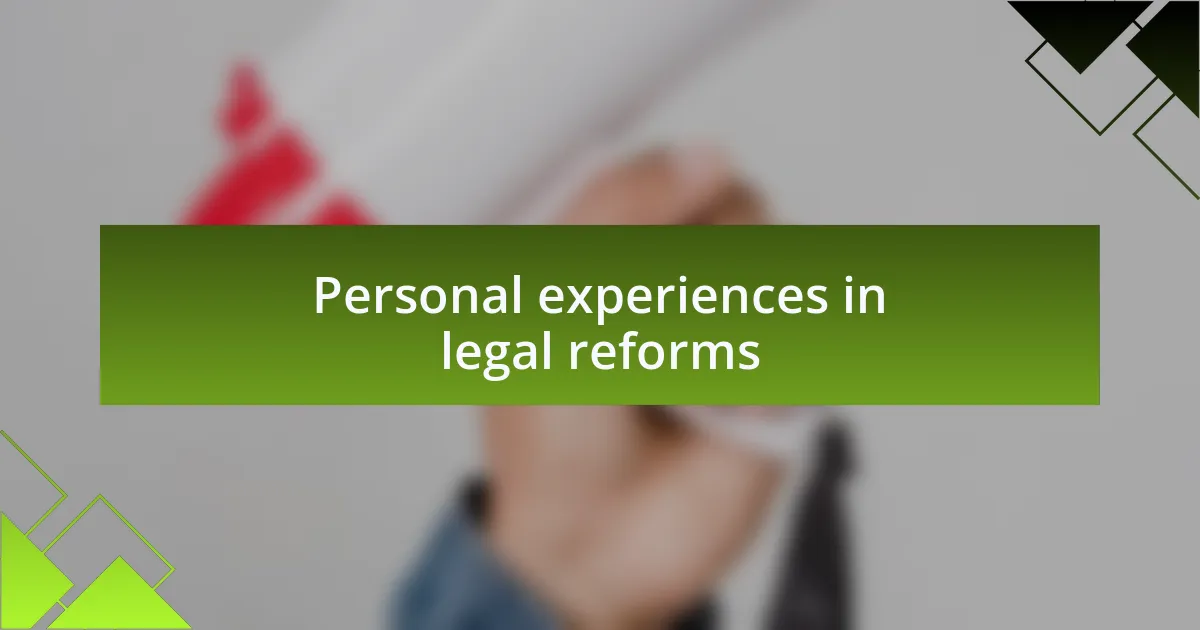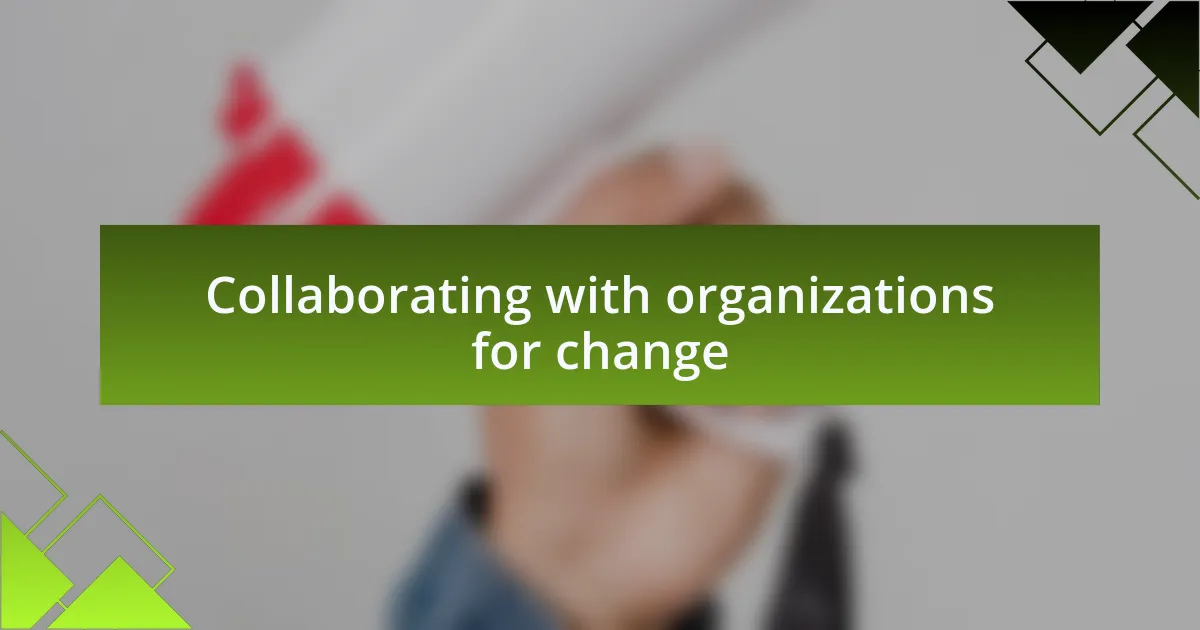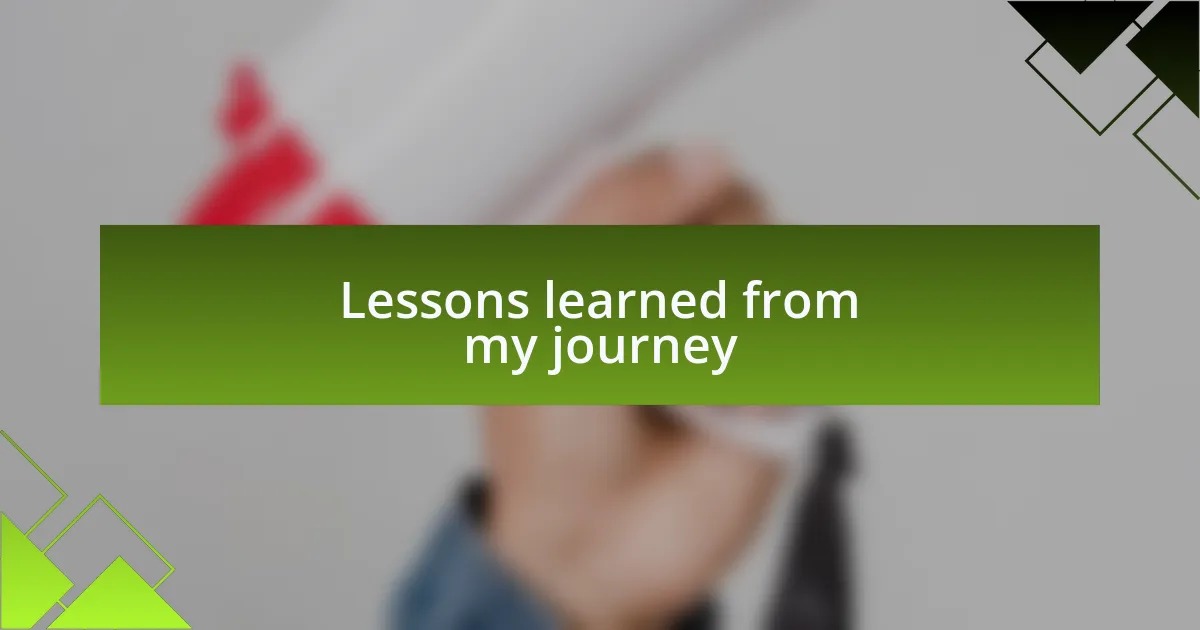Key takeaways:
- The anti-death penalty movement emphasizes the value of human life and highlights the emotional toll of wrongful convictions.
- Personal engagement in legal reforms, such as attending community forums and participating in advocacy campaigns, fosters a sense of purpose and collective action.
- Collaborating with various organizations amplifies impact and unites efforts against the death penalty, showcasing the importance of shared experiences.
- Storytelling and empathy are crucial in advocacy, as personal narratives humanize the issues and foster understanding of the emotional weight of legal decisions.

Understanding anti-death penalty movement
The anti-death penalty movement is deeply rooted in the belief that every human life holds value, regardless of the crimes committed. I often reflect on the powerful anecdotes shared by those who have been wrongfully convicted and sentenced to death. Can you imagine the anguish of knowing your life hangs in the balance over a flawed justice system? These stories illustrate not just the potential for error, but the immense emotional toll it takes on individuals and their families.
In my exploration of this movement, I’ve encountered passionate advocates who highlight the societal impact of capital punishment. It’s fascinating to consider how the death penalty doesn’t deter crime, contrary to what many argue. I remember discussing this with a colleague who shared research showing states without the death penalty experience lower homicide rates. This information made me question: if the ultimate punishment doesn’t promote safety, what purpose does it serve?
There’s also a compelling moral argument against the death penalty, not just from a religious standpoint but from a humanitarian perspective. I’ve witnessed the inspiring dedication of activists who argue that systemic issues like poverty and racial bias influence sentencing. It makes me ponder how many lives could be saved if we redirected our energy towards rehabilitation instead of retribution. This shift in focus is vital for understanding the broader implications of the anti-death penalty movement.

Personal experiences in legal reforms
Engaging with legal reforms has been a transformative journey for me. I vividly recall attending a community forum where we gathered to discuss the implications of proposed changes to death penalty legislation. Listening to the personal narratives of family members who lost loved ones to wrongful executions struck a powerful chord within me. Their pain was palpable, and it made me realize how necessary these reforms truly are.
In another instance, I joined a local advocacy group that organized letter-writing campaigns to lawmakers. As I crafted each letter, I found myself infused with a sense of purpose; expressing my thoughts on the need for reform felt like a small yet important contribution. I often wondered: could these words influence even one person in power to reconsider their stance? This type of grassroots engagement has left me invigorated, reaffirming that collective voices can indeed foster change.
Reflecting on my involvement, I’ve come to understand that participating in legal reforms is an ongoing commitment. I can still remember the first time I spoke to a group of law students about the emotional weight of capital punishment. Seeing their eyes opened to the complexities of the issue made me hopeful. It reminded me that each discussion, each shared story, is another step towards a more just and humane legal system.

Collaborating with organizations for change
Collaborating with various organizations has been a cornerstone of my advocacy work. I recall a pivotal moment when I partnered with a national anti-death penalty group to host a public symposium. It was enlightening to see how shared resources and knowledge cultivated a community united in purpose. Together, we developed strategies that amplified our reach and deepened our impact.
One experience that stands out is when I participated in a coalition that included former inmates and their families. Their testimonies about wrongful convictions were not only heart-wrenching but also a powerful reminder of the real human cost of the death penalty. Listening to them made me question: how can we continue to support systems that deny justice? This collaboration was transformative, as it sharpened our collective voice and underscored the urgency of our mission.
Through these partnerships, I’ve learned that we are stronger together. Engaging with seasoned activists and organizations has deepened my understanding of systemic issues. It often leaves me thinking—what if every advocate found a way to connect with others? This interconnectedness could very well be the key to meaningful and lasting change in the legal landscape.

Lessons learned from my journey
Engaging with the legal system revealed to me the profound power of storytelling. During a campaign to highlight the experiences of wrongful convictions, I was surprised by how sharing personal narratives not only moved audiences but also humanized the statistics. I remember a young man’s face lighting up as he spoke about his release after years in prison—how could I have anticipated the depth of connection that would create? It made me realize that the legal system isn’t just about laws; it’s about lives.
One crucial lesson I’ve internalized is the importance of patience. The legal system moves slowly, often frustratingly so. I found that after presenting a compelling case, the wait for outcomes could be agonizing. However, these moments of waiting taught me resilience. They forced me to reflect: how can we stay hopeful and active during the long grind of advocacy? I learned that every small victory, no matter how incremental, is a step toward breaking down the barriers of injustice.
Lastly, I came to appreciate the role of empathy in advocacy. Knowing someone personally affected by the death penalty radically changed my perspective. It was during a discussion with a mother who had lost her son that I grasped the depth of grief entangled with these legal decisions. This experience prompted me to ask: how can we truly advocate for change without understanding the emotional weight borne by those impacted? Building empathy in our efforts not only amplifies our message but also fosters a supportive community ready to challenge the status quo.